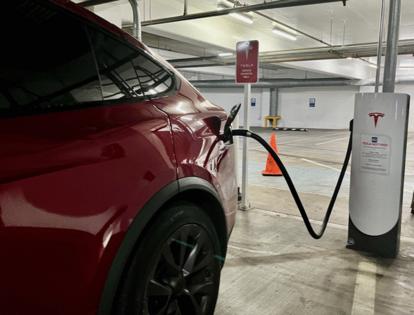Editorial: US automakers, stop hiding behind trade barriers and compete with the Chinese
Published in Op Eds
When the federal government’s electric-vehicle tax credits expired on Sept. 30, Hyundai made its move. The Korean automaker knocked as much as $10,000 off the price of its EVs in the U.S., more than making up for the taxpayer-funded $7,500 credit the GOP canceled years ahead of schedule in its “One Big Beautiful Bill Act.”
So, were Hyundai and the rest gouging Americans all along, using the tax incentive to greedily jack up profits? Doesn’t look that way: Market leader Tesla makes a decent profit, but for most other automakers, gas-powered vehicles have been much more profitable than their battery-operated counterparts. The credits were always meant to be temporary, and they’ve run their course. Whether Americans actually want electric vehicles is a question politicians can’t answer — only the market can.
Automakers should now prove they can stand on their own.
As always, this page is skeptical when the government tries to pick winners and losers across the economy. Central planners never do as good a job as a free market in allocating resources, and tax-dollar giveaways rarely succeed as intended. With the demise of the credits, Americans miffed at Democrats for trying to force EVs on them can claim a victory of sorts.
Yet the outlook is fraught because of one big problem: China.
American automakers are losing a fight for the future against competitors bankrolled by the Chinese government. Stepping back and letting it happen stands to reduce economic growth, especially in the auto-dependent Midwest, and put America’s national security at risk as well.
So far, America’s response to the stiff competition is to bar Chinese vehicles altogether. President Donald Trump and former President Joe Biden, opposites in so many ways, agreed that opening the U.S. market to Chinese EV imports would hurt Detroit. Both administrations imposed enormous tariffs that keep out the competing vehicles.
As a temporary measure giving U.S. automakers an opportunity to play catch-up, the tariffs are understandable. But permanent protectionism is poison for innovation. Those trade barriers hurt American consumers who otherwise could be saving a fortune on their next vehicle purchase. And history shows that trade barriers can’t be sustained forever. America must gear up to beat its Chinese competitors mano a mano — and that’s not happening.
U.S. automakers just booked an excellent quarter for EV sales, as car buyers responded to the end of credits by accelerating purchases. Next quarter’s EV sales are expected to flatline, as they did when Germany eliminated a similar tax subsidy.
Into this sluggish sales environment, automakers will need to unload tens of thousands of EVs they have already manufactured. Some, like Hyundai, have decided to keep sales going by piling money on the hoods. Others will provide less direct incentives, while hoping their new EV and battery plants don’t go completely idle during the widely expected downturn ahead.
When its credits expired, Germany was much further along in adopting EVs than the U.S. Princeton University’s Zero Lab predicts that battery-powered EV sales in the U.S. will be about 40% lower as of 2030 without the credits than if the GOP had elected to continue them.
The Trump administration appears content to keep trade barriers in place and encourage Detroit to make gas-powered SUVs and pickup trucks for as long as possible. In that scenario, America’s expensive EVs are destined to be niche players at home and abroad. There’s also the question of whether Americans want — or can afford — electric vehicles.
If that’s the extent of the policy, the world will move on, and Detroit will be left in the dust. EV sales this year are expected to exceed 20 million vehicles, and China will make two-thirds of them, including millions for export. Anyone who thinks EVs are going away isn’t paying attention to the global market, especially emerging markets where, absent trade barriers, affordable Chinese models dominate.
Most Americans don’t recognize company names like BYD, Geely and Great Wall, but you’d better believe the Big Three know them. Ford’s Jim Farley has called China’s progress on EVs “the most humbling thing I have ever seen,” and said it poses a “colossal” threat to Ford’s future.
Chinese EV makers, bolstered by significant government subsidies, have built a big advantage in manufacturing capacity, speed of design, supply-chain networks and, especially, price. While all EVs are cheap to operate over their lifetimes – no gas required, few moving parts to repair — China is making high-quality vehicles at astonishingly low sticker prices. American automakers can’t come close.
To get the EV market moving again, it’s time to consider relaxing the trade barriers, with important conditions: Chinese automakers should be required to assemble cars in the U.S., ideally through joint ventures with American automakers. Their cars must meet U.S. safety standards and pass inspection for spyware and other dirty tricks the Chinese might try to embed into these rolling computers.
Taking on the Chinese automakers directly instead of hiding behind a tariff wall would have positive knock-on effects for the U.S. China’s success with EVs has enabled it to expand its lead in batteries, navigation and robotics, which are important military technologies. The war in Ukraine has demonstrated how drones with advanced batteries and sensors can win battles, while self-driving technology can be adapted to guide unmanned weapons of all kinds.
America’s auto industry is an important strategic asset. It needs to be a world beater again, and that won’t happen unless it can meet the competition head-on.
_____
©2025 Chicago Tribune. Visit at chicagotribune.com. Distributed by Tribune Content Agency, LLC.
























































Comments